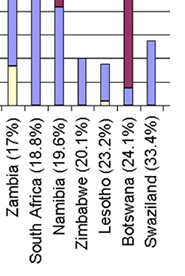Zuma is unconvincing
Tuesday, April 28th, 2009 by Fungai MachiroriWill the new South African president, Zuma, break into spontaneous dance whenever he delivers a speech to the international community?
So far ( as far as I know), he has managed to keep his rousing rendition of the now out-of-context Umkhonto we Sizwe war cry ‘Mshini Wami’ confined to national fora such as political rallies and other platforms he has been provided to defend his innocence against the many charges levelled against him in the recent past.
The reason I ask is simple. Beyond his amazing agility and moves to rival Michael Jackson in the prime of his musical career, Zuma doesn’t seem to offer much else.
Now, to be sure, I have serious problems in looking beyond the misgivings of a man who claims that taking a shower after unprotected sex with an HIV-positive person can prevent transmission of the virus. That statement will forever stick in my mind whenever Zuma’s name is mentioned to me.
But after all his run-ins, and let-offs by the rule of law, I thought it only decent of me to give him an ear at the last ANC rally held last weekend in Johannesburg.
I will admit that I haven’t listened to many of his speeches, but called the Siyanqoba (We shall conquer) rally, and the last that the ANC held prior to elections that Wednesday, I expected Zuma to give the most rousing speech of his political career.
But oh, so drawl and monotonous was he that I dozed off a few times, as I watched. Was that un-emotive expressionless list of promises to make South Africa a better nation really what the people wanted to hear?
And when he promised to fight corruption, I couldn’t help the smirk that instantly appeared on my face. More transparent tendering processes and less misappropriation of public resources?!
That sounded like a page out of a Grimm’s fairytale.
While functional, apart from clever little statements like stating that South Africans ought to “put sport back into our national psyche” in the build-up to the 2010 World Cup, I found his speech drab and quite banal. Nothing in it would give anyone a shiver down their spine, which is what good speeches tend to do.
While he will never be an Obama in terms of his oratory, Zuma needs to start sounding a bit more convincing that he is a changed man and not some reluctant school kid forced to stand up and read his short story to the rest of the class.
His political persona already doesn’t look so good – what with a trail of corruption cases behind him – and other near-miss charges he has managed to worm his way out of.
Speech has power to convince. You only need look at the immortal place that Martin Luther King Jnr holds in history because of his ‘I have a dream’ speech.
And though more sinister, no one can deny the power of Adolf Hitler’s oration in convincing the German masses of the ‘goodness’ of Nazism.
For me, there’s nothing to savour about Msholozi’s political character yet – until, of course, he breaks into that ubiquitous theme song and jumps across the podium belting out “Mshini Wami, Mshini Wami.”
Have you ever noticed how the South African media focuses so intently on this aspect of Zuma in its coverage of him? With dance moves that crisp, he could put many a young man less than half his age to shame. Yes, that forms part of his ‘everyman’ appeal. But that should not become the hallmark of his persona.
Zuma has to appeal to a larger audience than just South Africans who have recently become disgruntled with the ANC and thus see him as the agent of necessary reform.
He has to appeal to regional and global audiences, to represent South Africa, and Africa as a respectable statesman in the mould of his predecessors who include Nelson Mandela.
And sadly for him, he will have to do all of that without the dancing.
For me, my greatest hope for Zuma’s reign is that he can combat the HIV epidemic that is currently wreaking havoc in South Africa and sending shock waves throughout southern Africa. For one who himself peddled gross misinformation about ways to prevent HIV transmission, this would represent the greatest victory in overcoming the very ignorance that continues to kill so many.
I sincerely hope that come May 9, at the presidential inauguration of Zuma, I will become more convinced by this man who holds the hopes and destiny of not only his nation, but the whole region.










